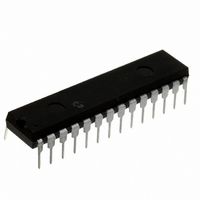PIC18F24J10-I/SP Microchip Technology, PIC18F24J10-I/SP Datasheet - Page 28

PIC18F24J10-I/SP
Manufacturer Part Number
PIC18F24J10-I/SP
Description
IC PIC MCU FLASH 8KX16 28-DIP
Manufacturer
Microchip Technology
Series
PIC® 18Fr
Datasheets
1.PIC16F616T-ISL.pdf
(8 pages)
2.PIC18F24J10-ISO.pdf
(368 pages)
3.PIC18F24J10-ISO.pdf
(6 pages)
4.PIC18F24J10-ISO.pdf
(6 pages)
5.PIC18F24J10-ISO.pdf
(12 pages)
6.PIC18F44J10-IPT.pdf
(358 pages)
Specifications of PIC18F24J10-I/SP
Program Memory Type
FLASH
Program Memory Size
16KB (8K x 16)
Package / Case
28-DIP (0.300", 7.62mm)
Core Processor
PIC
Core Size
8-Bit
Speed
40MHz
Connectivity
I²C, SPI, UART/USART
Peripherals
Brown-out Detect/Reset, POR, PWM, WDT
Number Of I /o
21
Ram Size
1K x 8
Voltage - Supply (vcc/vdd)
2.7 V ~ 3.6 V
Data Converters
A/D 10x10b
Oscillator Type
Internal
Operating Temperature
-40°C ~ 85°C
Processor Series
PIC18F
Core
PIC
Data Bus Width
8 bit
Data Ram Size
1 KB
Interface Type
SPIC/I2C/EUSART
Maximum Clock Frequency
40 MHz
Number Of Programmable I/os
21
Number Of Timers
3
Operating Supply Voltage
2 V to 3.6 V
Maximum Operating Temperature
+ 85 C
Mounting Style
Through Hole
3rd Party Development Tools
52715-96, 52716-328, 52717-734, 52712-325, EWPIC18
Development Tools By Supplier
PG164130, DV164035, DV244005, DV164005, PG164120, DM183032, DV164136
Minimum Operating Temperature
- 40 C
On-chip Adc
10-ch x 10-bit
Package
28SPDIP
Device Core
PIC
Family Name
PIC18
Maximum Speed
40 MHz
Lead Free Status / RoHS Status
Lead free / RoHS Compliant
For Use With
AC162074 - HEADER INTRFC MPLAB ICD2 44TQFPAC162067 - HEADER INTRFC MPLAB ICD2 40/28P
Eeprom Size
-
Lead Free Status / Rohs Status
Lead free / RoHS Compliant
- PIC16F616T-ISL PDF datasheet
- PIC18F24J10-ISO PDF datasheet #2
- PIC18F24J10-ISO PDF datasheet #3
- PIC18F24J10-ISO PDF datasheet #4
- PIC18F24J10-ISO PDF datasheet #5
- PIC18F44J10-IPT PDF datasheet #6
- Current page: 28 of 368
- Download datasheet (6Mb)
PIC18F45J10 FAMILY
2.6
Many microcontrollers have options for at least two
oscillators: a high-frequency primary oscillator and a
low-frequency
Section 3.0 “Oscillator Configurations” for details).
The oscillator circuit should be placed on the same
side of the board as the device. Place the oscillator
circuit close to the respective oscillator pins with no
more than 0.5 inch (12 mm) between the circuit
components and the pins. The load capacitors should
be placed next to the oscillator itself, on the same side
of the board.
Use a grounded copper pour around the oscillator
circuit to isolate it from surrounding circuits. The
grounded copper pour should be routed directly to the
MCU ground. Do not run any signal traces or power
traces inside the ground pour. Also, if using a
two-sided board, avoid any traces on the other side of
the board where the crystal is placed. A suggested
layout is shown in Figure 2-4.
For additional information and design guidance on
oscillator circuits, please refer to these Microchip
Application Notes, available at the corporate web site
(www.microchip.com):
• AN826, “Crystal Oscillator Basics and Crystal
• AN849, “Basic PICmicro
• AN943, “Practical PICmicro
• AN949, “Making Your Oscillator Work”
DS39682E-page 26
Selection for rfPIC™ and PICmicro
and Design”
External Oscillator Pins
secondary
®
Oscillator Design”
®
oscillator
Oscillator Analysis
®
Devices”
(refer
to
FIGURE 2-4:
2.7
Unused I/O pins should be configured as outputs and
driven to a logic low state. Alternatively, connect a 1 kΩ
to 10 kΩ resistor to V
output to logic low.
Main Oscillator
Guard Ring
Guard Trace
Secondary
Oscillator
Unused I/Os
SUGGESTED PLACEMENT
OF THE OSCILLATOR
CIRCUIT
SS
© 2009 Microchip Technology Inc.
on unused pins and drive the
13
14
15
16
17
18
19
20
Related parts for PIC18F24J10-I/SP
Image
Part Number
Description
Manufacturer
Datasheet
Request
R

Part Number:
Description:
Manufacturer:
Microchip Technology Inc.
Datasheet:

Part Number:
Description:
Manufacturer:
Microchip Technology Inc.
Datasheet:

Part Number:
Description:
Manufacturer:
Microchip Technology Inc.
Datasheet:

Part Number:
Description:
Manufacturer:
Microchip Technology Inc.
Datasheet:

Part Number:
Description:
Manufacturer:
Microchip Technology Inc.
Datasheet:

Part Number:
Description:
Manufacturer:
Microchip Technology Inc.
Datasheet:

Part Number:
Description:
Manufacturer:
Microchip Technology Inc.
Datasheet:

Part Number:
Description:
Manufacturer:
Microchip Technology Inc.
Datasheet:










